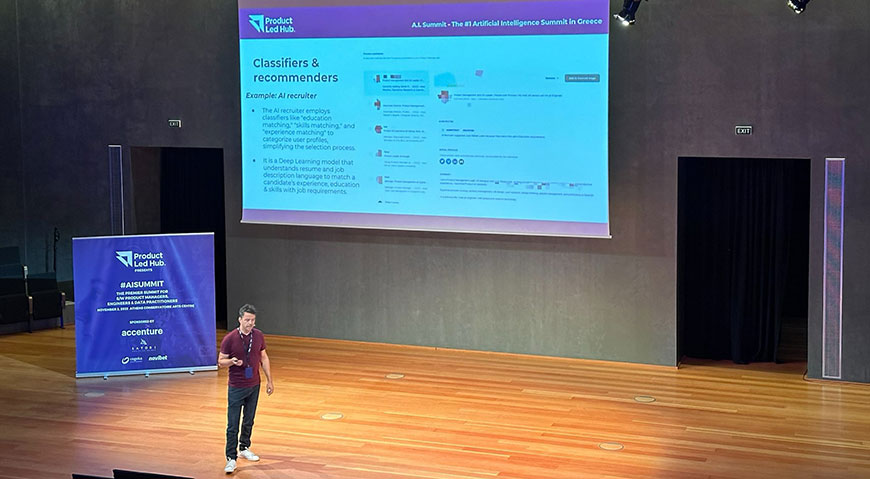- Posted by: blignos
- Published: 07-11-2023
- Category: Security articles
The Transformative Power of AI: Insights from #AISummit
Artificial Intelligence (AI) has become an integral part of the business landscape, transforming the way companies operate, innovate, and interact with their customers. Recent summit sessions shed light on various aspects of AI and provided invaluable insights into its current and future impact on businesses. Below, there are some highlights that made us rethink the way we can incorporate AI into our daily product life.
AI for Product Management
One of the key themes that emerged from the conference was the pivotal role AI plays in product management. The first session explored how AI influences the product roadmaps of technology companies and supports Product Managers in their daily responsibilities. We gained a deeper understanding of how AI can improve documentation and requirement analysis for feature development. By leveraging AI, businesses we can create more accurate requirements that are not only technically feasible but also aligned with customer needs, ultimately enhancing product development processes.
The Future of Product Development in the Age of A.I.
AI projects have rapidly evolved, prompting businesses to adapt to shifting needs and deliverables. The session emphasized the challenges and opportunities associated with embracing AI technology. In particular, it highlighted the importance of addressing the immaturity in AI adoption, especially among small and medium-sized enterprises (SMEs). Speakers proposed innovative solutions to bridge this gap, ensuring that AI becomes an integral part of product development in the ever-evolving technological landscape. By acknowledging these challenges and embracing AI, companies can position themselves at the forefront of innovation and remain competitive in their respective industries.
Learnings from Deploying Enterprise Open AI
Enterprise businesses are increasingly recognizing the value of Open AI in enhancing productivity. The speaker shared practical experiences of implementing Open AI scenarios in various sectors, including energy, financial services, and manufacturing. Attendees discovered how Open AI, when combined with proprietary data, can create tangible business value. It can be utilized for developing internal search assistants, chatbots, language models for feature extraction, summarization, and documentation creation, as well as integrating it into process automation. Despite the hype surrounding Open AI, the session emphasized the importance of addressing common challenges, such as dealing with messy data, ensuring security, and protecting data privacy. The establishment of a Centre of Excellence was highlighted as a crucial step in harnessing the long-term significance of Open AI for competitive success.
How to Align AI & Product Teams
Effective collaboration between AI and Product teams is critical for ensuring the successful utilization of AI systems within an organization. This session shared strategies for creating a shared development cycle and distributing ownership of common workflows. By fostering collaboration, businesses can maximize the utilization of AI across various areas, resulting in improved innovation and efficiency. Attendees learned that aligning AI and Product teams is essential for avoiding the common pitfall of AI projects ending up unused or lacking real value.
AI for Product...Hype or the New Normal?
With the recent surge of AI-powered products in the market, it has become imperative to distinguish between hype and genuine customer needs. This session provided insights into identifying user needs and using AI as a catalyst to address these requirements. Attendees learned how to identify use cases for AI in product development and integrate them into product roadmaps effectively. The challenges and considerations associated with these developments were also discussed, offering strategies to overcome them. Ultimately, businesses were encouraged to use AI to solve real user needs rather than succumbing to the AI hype, ensuring that AI implementations bring tangible value to both the company and its customers.
Unleashing the Potential of AI: Exploring Business Opportunities and Challenges
The potential of generative AI in fostering business innovation was a central theme in this session. Attendees delved into the intricacies of harnessing generative AI's potential, shedding light on its role and limitations. By unlocking the full potential of data analytics and machine learning in conjunction with generative AI, businesses can improve corporate performance and bolster competitiveness. The session also addressed prevalent misconceptions and the obstacles that arise when implementing generative AI in practical scenarios. It emphasized the importance of navigating the ethical considerations of AI as it becomes increasingly integrated into various aspects of business operations.
How to Unlock Business Potential with Conversational A.I.
Conversational Artificial Intelligence is playing an increasingly significant role in today's business landscape. This session focused on how businesses are leveraging this technology to enhance customer interactions and maintain a competitive edge. Businesses are now exploring the realm of human-like AI implementations, offering benefits such as operational efficiency, quality control, cost savings, lead generation, improved satisfaction, and enhanced customer experience. The applications of Conversational AI span across various industries, from e-commerce giants to healthcare providers, financial institutions, and customer service hubs. This technology is revolutionizing the way businesses interact with their customers by providing natural language processing and machine learning capabilities that understand and respond to human interactions in ways never before imagined.
A.I. and Ethics - The Alignment Problem
Ethical considerations in AI were a prominent theme of the conference. The session provided a comprehensive historical overview of the evolution of AI, highlighting key milestones and breakthroughs that have shaped its progression over time. Attendees gained valuable insights into the ethical implications of AI and the challenge of aligning AI systems with human values and goals. As AI continues to advance and become more integrated into various aspects of our lives, it raises important questions about ensuring its responsible and ethical use. The concept of the "alignment problem" was a focal point of discussion, as it pertains to the challenge of aligning AI systems with human values and goals.
In conclusion, the conference sessions offered a comprehensive overview of the transformative power of AI in today's business landscape. AI is no longer a buzzword but a practical tool that, when used thoughtfully, can revolutionize product management, enhance productivity, and provide innovative solutions to common business challenges. Moreover, the ethical implications of AI are a critical consideration as we navigate the evolving landscape of artificial intelligence. As businesses continue to adopt AI technologies, it is essential to align them with customer needs, address ethical concerns, and leverage AI to create real value. The world of AI is rapidly evolving, and staying informed and ethical in its application is vital for the continued success of businesses in the digital age.
Written by Maria-Christina Antoniou

















